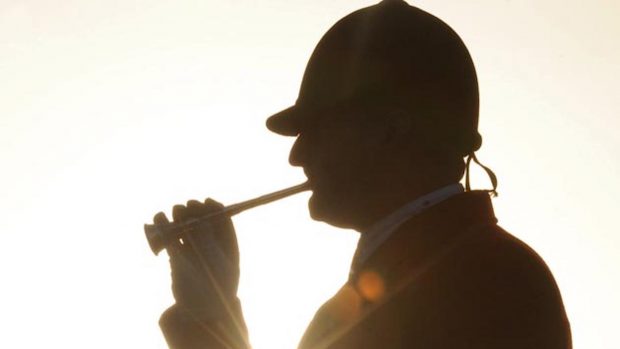“I think ‘cult’ is a very accurate description [of LACS],” says Miles Cooper, a former employee of IFAW and LACS, who, like Graham Sirl, underwent a dramatic change of opinion as he began to learn more about hunting.
“The anti-hunt movement was never very big, it was based on a small core group of animal rights people — many of whom never understood what they were doing, or why they were there.
“I became concerned that we were shoehorning evidence to suit our own political agenda and I think we were misleading people.”
Early days
Cooper says his is a “familiar saboteur story” — joining friends at a hunt while at college in 1988, getting caught up in the passion, knowing little about hunting but joining the antis. He began to follow hunts as many as five days a week as a LACS volunteer, and when he graduated from a theology degree at Oxford, Cooper was employed by IFAW as it joined forces with the RSPCA and LACS to form the CPHA.
“During the time of the Foster Bill [1997] I was paid by IFAW but worked under the auspices of LACS, rebutting pro-hunting letters in the press,” he says. “I thought at the time there were different opinions expressed in the [pro-hunting] letters, but we had to dismiss them and relied on our ‘formula’ to over- turn pro-hunt opinion.”
Doubting times
Once in IFAW employment, after 10 years of vigorous campaigning against something he admits he knew little about, Cooper says he began to feel increasingly uncomfortable.
“I had little flashes of doubt, little indications over quite a long period of time telling me ‘I’m not sure about this’,” he recalls. “There were a lot of people, particularly in the memberships of these organisations, who rely solely on PR departments to tell them what hunting is without actually going out, seeing it and talking to people.
“Inevitably, there is a massive gap in terms of real understanding — of course you can mount the most fantastic, well-organised, glossy campaign on the basis of ignorance and I think that’s basically what we did. We were not entirely honest with people and weren’t giving them the whole picture.”
Total ignorance
Cooper was commissioned by LACS to do a study on gun packs and began to have “misgivings” about them. To his shock, he discovered the IFAW head of press at the time had no idea gun packs even existed.
“The ignorance — not in the derogatory way but just total lack of knowledge — was quite frightening. How could we really sit there and say ‘we know better than you’?” he says.
“I began to have severe misgivings about gun packs, not least for animal welfare, but also for public safety and public law and order. I felt we might be better sticking with hunting with hounds at the end of the day.”
Time to change
Cooper said he vented his misgivings in private, and struck up dialogue with Jim Barrington, who put him in touch with the Countryside Alliance (CA) and the Federation of Welsh Packs.
“It was the first opportunity I’d had to actually speak to people who knew what they were talking about, and what the implications would be of the proposed legislation.
“Ultimately, as I matured through those organisations, from being a common-garden hunt monitor to working closely with Jim Barrington, Howard Hodges, Graham Sirl and then undercover with Kevin Hill and Peter White, there was a gradual maturing process. But I couldn’t understand how my colleagues’ understanding of hunting wasn’t maturing and developing in line with what we were seeing.
“There seemed to be a lack of detailed thought going on — ‘OK, I may have seen this happen today, but what is the wider context?’”
Speaking out
In 2002, as Alun Michael launched his consultation on the Hunting Act, Miles Cooper decided the time was right to speak his mind. He sent an e-mail to the rural affairs minister asking if he could offer his opinion. Hearing nothing, he contacted Jim Barrington, now of the Middle Way Group, and Simon Hart, CA chief executive.
“Despite it going against everything I’d previously stood for, I was completely reassured that theirs was the right approach. The issue was what sort of legislation would be best for animal welfare, protect the hunts and jobs and do best for the farmers,” says Cooper, adding that if the two “camps” had talked with each other, as opposed to argue, a lasting solution might have been found.
“It put my heart at rest, so I could stand up and say why I’d changed my mind and that there was a way forward,” he says. “So we held a press conference in May — which went down like a lead balloon.
“LACS is a very paranoid organisation and it’s very difficult in that environment to maintain an independent opinion. By the end of that day, I had a number of irate phone calls on my answer machine — disgusted, annoyed and upset with what I’d done. Some people asked ‘wouldn’t it have been better to just shut up’.
“The overriding impression from the response I got was that a lot of IFAW colleagues in private probably had similar misgivings, but thought giving in to the opponent was embarrassing and difficult.”
Knowledge and understanding
In the past three years, Cooper has learnt more and more about hunting, and become more involved. He has been out mounted with the Warwickshire, taken up shooting and ferreting and now has plans with some friends and colleagues to start up a Beagle pack to hunt “within the law”.
Now living in Wallington, south Oxfordshire, and working as a teacher in a juvenile prison, he has stepped away from the hunting debate — but hints that he would like to get involved again.
“Hunting is one of those things that, no matter which side of the debate you’re on, once it’s bitten you — that’s it,” he says.
Of the hunting ban, Cooper is very defined in his opinion.
“All we have in the Hunting Act is expedience over evidence and prejudice over principle. There’s no measurable benefit to animal welfare and it’s undoubtedly failed — Labour’s best efforts have been a complete failure.
“They can’t expect people simply to pack up their livelihoods — which they know to be right — and just walk away when they know wrong has been done by them.”
SUBSCRIBE TO HORSE & HOUND AND SAVE Enjoy all the latest equestrian news and competition reports delivered straight to your door every week. To subscribe for just £1.43 a copy click here >>
|



